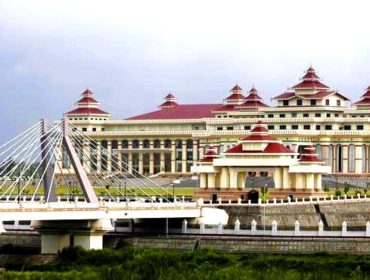By Haerin Shin
On my next visit, I told her the piece was indeed impressive, so beautiful and sad – the language exquisite and the imagery so vivid. But was there any particular reason why she favored this poem over others, since it was neither the best known nor the most critically acclaimed poem in Seo’s collection? To this, she was vague and evasive—that someday, I might just understand. “But then,” she mused, “things might be different by the time you come of age. Let’s just hope you won’t be living in our ashes…”
Ashes…? Yes, the bride, her ashes. But what does that have to do with my grandmother? Who’s the “we” in “our” ashes? I shuddered at the association, it reminded me of cremation. Especially since it was so evident that she was counting her days until. …..Well. Seeing the fear in my eyes, she stretched out a trembling hand and patted my cheek.
Grandmother soon lapsed into dementia, and the following year, she passed away. Grandfather decided to move into a smaller apartment, the void she had left behind being more unbearable than he had expected. My parents and I were sorting through grandmother’s belongings when I came across a photo of her in full bridal regalia, surrounded by a crowd of people in the imperial garden. Her gaze primly riveted to the ground, she looked proud, but also, sad… Father looked over my shoulder and told me that this snapshot had been taken during the annual ceremony for the Saimdang Award, a national prize bestowed upon women who had exhibited outstanding achievements as a supportive wife, wise mother, and in parenthesis, an artist.
Wife and mother. Wife of my grandfather, mother of my father. But where was my grandmother in this picture? Her own dreams, her ambitions, the private and intimate constitutions of her life? What was the story behind this award dedicated to this woman, so ostentatiously decked out in silk and ornaments, her withered cheeks painted red and her sparse hair gathered together under an imposing bun of a wig?
It was then, and there, that I saw the Bride. Petrified, waiting for the wayward love she had never been able to grasp, lamenting wasted hopes. Fettered to her bridal suite, singing the silent songs of her untold stories, mourning the might-have-beens. And finally, rewarded for remaining in the shadows of the grander narratives woven out in the light of day.
Father had followed grandfather’s path and passions; grandmother had lived to see my mother, in her turn, take on the legacy of the Bride. The excruciating memory of non-existence, the agonizing wait for someone to call her forgotten name… Suddenly it all clicked together, it all became clear. My parents were residual hauntings of the life she could not escape. In the bitter cold of the wintry garden, she had tried to pull her son into her suffocating life, yearning to cut off his escape and make him understand the pain of those left behind. But every time she saw her own portrait in mother’s obedient face, with the solemn murmurs of the men discussing the state of affairs and future directives for some incomprehensible national policies settling in as the backdrop, she knew she had failed. Silently, she resented. And resignedly, waited. For the final closure, for that liberating breeze to carry away her ashes and sprinkle them among grounds she had never set foot on.
So, had she been freed?
As I tore my gaze away from the photograph, I saw my mother standing covered in grandmother’s ashes. There she stood, amid the sediments of all her foremothers, all my foremothers, the underside of history repeating itself in an endless, vicious cycle.
I saw the Bride.
Original Text by Jeong-ju Seo (Translated by the author of this story, Haerin Shin)
“The Bride”
The bride in grass-green blouse crimson skirt with only her hair braided behind the ears let loose, was sitting aside of her groom in wait for the first night of the wedding, the groom was hit by a sudden urge to take a leak and as he hurriedly arose and ran out the train of his clothes was caught by the hinge. Thinking it was the bride pulling him from behind out of lewd impatience, the imprudent groom walked away without even once looking back. Flapping the shirt torn by the hinge, he took his leak and took off, dismissing her for impropriety. After 40, 50 years, passing by the bridal suite in the course of running some other errands, he opened the door and peeked in out of momentary curiosity; the bride was still sitting there in her grass-green blouse and crimson skirt, with only her hair braided behind the ears let loose as on the night of the wedding. Feeling sorry, he went over and strokes her shoulders; only then did she collapse into a heap of pungent ashes. Into grass-green and crimson ashes.
Haerin Shin (Helen) is currently in Stanford Univ.’s Ph.D. program (comparative literature), Helen works on contemporary fiction in the US, Japan and Korea, focusing on topics such as psychoanalysis, memory and history, ghost theories (boo), and transnationalism. In love with all the cool stuff – science fiction / fantasy, anime, graphic narratives, ghosts (but of course)….name it!






